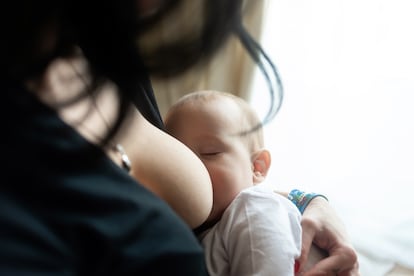The importance of breastfeeding visibility: ‘Today mothers watch tutorials to learn’
Women share their personal stories to combat misinformation on the subject

Èrica Cano had her son in the middle of the pandemic. Despite having done her research and knowing that she want to breastfeed her child, she remembers the beginnings as a struggle. In hindsight, she is glad to have succeeded, but she never imagined that it would be so complicated.
Mónica González had her twins at the 24th week of pregnancy. Days after the birth, one of the twins died. Mónica grieved while pumping to feed her other son, who was admitted to the NICU.
Claudia Maccioni was diagnosed with breast cancer in 2009. She underwent surgery and underwent various hormonal treatments. She became a mother in 2017 and 2021, against all odds, and she breastfed her two children with one breast.
These are three of the stories collected in Totes les lactàncies molen, a book that combines thirty testimonials to display the diversity of breastfeeding experiences. “We live in a society that idealizes motherhood and that stigmatizes us based on how we breastfeed our children,” explains Saioa Baleztena, the book’s co-author along with Mireia Serra i Vilà. “Whether someone breastfeeds because they want to or opts for a bottle because they haven’t breastfed, whatever your breastfeeding, everyone judges you,” Baleztena adds. “That is why it is important to make them visible, because otherwise, mothers end up experiencing loneliness, guilt and pressure.”
When Saioa became a mother, as she tried to manage her own breastfeeding, she came across Mireia’s story on social media under the hashtag #totesleslactanciesmolen. Mireia reflected that although she wanted to exclusively breastfeed her child, she could not do so due to her lack of support. Dozens of women began to use the hashtag to share their experiences, leading the authors to create a book bringing together the voices seeking a safe place.
Finding yourself in others’ experiences
Anthropologists Katherine Dettwyler and Patricia Stuart-Macadam defined breastfeeding as the quintessential biocultural phenomenon. “The most common problems arise in the first days, and most of the time they are technical problems due to the lack of a culture of breastfeeding, the advice of your own family, friends, sisters, your peers,” said José María Paricio, pediatrician and founder of APILAM and e-lactancia.org, in an interview with EL PAÍS. For Paricio, the loneliness of the first days is particularly difficult when problems such as nipple pain, cracks and other complications arise: “Today we are more alone than ever, and with child rearing even more so. There are mothers who watch tutorials to learn how to breastfeed because they don’t have anyone around them who can help them,” he laments.
For Sylvie Riesco Bernier, lactation consultant at Lactard and author of The Magic of Milk —a book that also compiles dozens of different testimonies about breastfeeding— , breastfeeding support groups try to make up for the lack of references and the loneliness that mothers suffer today. She also argues that mothers seek each other out: “We look for another woman who can’t sleep either, who has had a swollen breast and can tell you how she managed to reduce the pain, who is concerned about the percentiles, who takes off her watch and lets it flow, the one that only did it for two months or the one that did it for more than two years, the one that was mixed or the one that didn’t know how to wean her child.”

That is the power of first-person accounts, she believes: in the calm when you realize that what is happening to you is universal. “When I gave birth 11 years ago, I didn’t have those kinds of books within my reach. The voice was that of this pediatrician, that of an expert, that of the ideal text. We are used to hearing what ‘has to be done,’ but when we get to motherhood, getting to that way of doing it is often impossible. The 25 different stories that are in The Magic of Milk show a range that includes families of flesh and blood and real lactation,” she explains.
Alba Padró, lactation consultant and author of books such as Somos la leche (Grijalbo) and co-founder of the lactation and maternity application Lactapp, agrees with Riesco. She believes that mothers empathize with universal situations, even if they haven’t lived through them. “The parenting experience is usually pretty universal, despite differences related to society, culture or personal context,” she says.
For Saioa Baleztena, telling breastfeeding stories allows women to find themselves reflected in other experiences, preventing loneliness. She argues that stories are necessary to validate all kinds of experiences. “In the book we start from a premise: it is unfeasible to represent all lactations because there are as many lactations as there are people who breastfeed,” she adds. In her opinion, the book represents the diversity of forms of breastfeeding: “We collect personal experiences that are representative of the experiences of many other people. Whether or not we look for ourselves in these stories, we know hat there is a pending debt in the narrative of the diversity of forms of breastfeeding, a need to put an end to the sweetened story of maternity and breastfeeding and to embrace and validate all stories.”
Sign up for our weekly newsletter to get more English-language news coverage from EL PAÍS USA Edition
Tu suscripción se está usando en otro dispositivo
¿Quieres añadir otro usuario a tu suscripción?
Si continúas leyendo en este dispositivo, no se podrá leer en el otro.
FlechaTu suscripción se está usando en otro dispositivo y solo puedes acceder a EL PAÍS desde un dispositivo a la vez.
Si quieres compartir tu cuenta, cambia tu suscripción a la modalidad Premium, así podrás añadir otro usuario. Cada uno accederá con su propia cuenta de email, lo que os permitirá personalizar vuestra experiencia en EL PAÍS.
¿Tienes una suscripción de empresa? Accede aquí para contratar más cuentas.
En el caso de no saber quién está usando tu cuenta, te recomendamos cambiar tu contraseña aquí.
Si decides continuar compartiendo tu cuenta, este mensaje se mostrará en tu dispositivo y en el de la otra persona que está usando tu cuenta de forma indefinida, afectando a tu experiencia de lectura. Puedes consultar aquí los términos y condiciones de la suscripción digital.









































